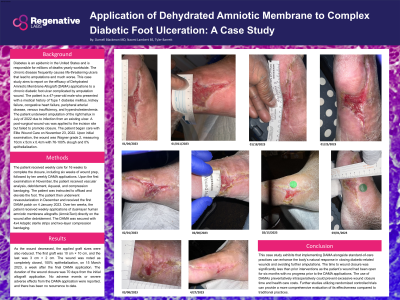Case Series/Study
(CS-021) Application of Dehydrated Amniotic Membrane to Complex Diabetic Foot Ulceration: A Case Study
Thursday, May 16, 2024
7:30 PM - 8:30 PM East Coast USA Time

John Shou, PharmD – Baylor College of Medicine; Naomi Lambert, BS – Regenative Labs; Tyler Barrett, NA – Regenative Labs
Introduction: Diabetes is an epidemic in the United States and is responsible for millions of deaths yearly worldwide. The chronic disease frequently causes life-threatening ulcers that lead to amputations and much worse. Common comorbidities that increase the risk of ulceration and amputation include kidney disease, heart disease, and chronic venous insufficiency. This case study aims to report on the efficacy of Dehydrated Amniotic Membrane Allograft (DAMA) applications to a chronic diabetic foot ulcer complicated by amputation wound.
Methods: The patient in this study is a 47-year-old male who presented with a right foot diabetic ulcer of eleven months duration with osteomyelitis following incision and drainage with great toe amputation. Comorbidities that also hindered the natural healing of the wound include kidney failure, congestive heart failure, peripheral arterial disease, venous insufficiency, and hypercholesterolemia. The patient received weekly care for 16 weeks to complete the closure, including six weeks of wound prep, followed by ten weekly DAMA applications.
Results: Upon examination at the initial application, the wound was classified as a two according to the Wagner wound classification system. Upon inspection at the final visit, the wound was closed entirely and had no recurrence.
Discussion: This case study exhibits that implementing DAMA alongside standard-of-care practices can enhance the body’s natural response in closing late-stage Diabetic Foot Ulcers further complicated by surgical incisions and avoiding further amputations. The use of DAMAs preventatively intraoperatively could prevent excessive wound closure time and health care costs. Nonetheless, further studies utilizing nonrandomized and randomized controlled trials are required for a more comprehensive evaluation of its effectiveness compared to traditional practices.
Methods: The patient in this study is a 47-year-old male who presented with a right foot diabetic ulcer of eleven months duration with osteomyelitis following incision and drainage with great toe amputation. Comorbidities that also hindered the natural healing of the wound include kidney failure, congestive heart failure, peripheral arterial disease, venous insufficiency, and hypercholesterolemia. The patient received weekly care for 16 weeks to complete the closure, including six weeks of wound prep, followed by ten weekly DAMA applications.
Results: Upon examination at the initial application, the wound was classified as a two according to the Wagner wound classification system. Upon inspection at the final visit, the wound was closed entirely and had no recurrence.
Discussion: This case study exhibits that implementing DAMA alongside standard-of-care practices can enhance the body’s natural response in closing late-stage Diabetic Foot Ulcers further complicated by surgical incisions and avoiding further amputations. The use of DAMAs preventatively intraoperatively could prevent excessive wound closure time and health care costs. Nonetheless, further studies utilizing nonrandomized and randomized controlled trials are required for a more comprehensive evaluation of its effectiveness compared to traditional practices.

.jpeg)